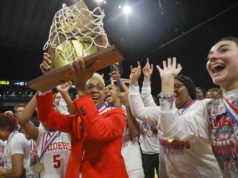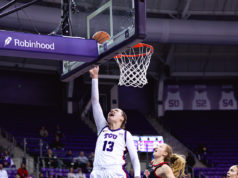You might not follow non-revenue sports the way diehard Frog fanatics do, but TCU men’s tennis made recent history by besting second-seed and conference champion Texas to earn the program’s first outdoor national championship. Coach and Frog letterman David Roditi has built a tennis juggernaut downhill from the Greek Village, but the timing of this particular accomplishment is surprising even accounting for the program’s prominence. Roditi’s racket Frogs have reached the NCAA semifinals only twice before this year during his 14-year tenure, and it seemed a hump his crew just wasn’t capable of ascending even with overpowering squads and top rankings. There have been other successes. The men’s team has won the indoor tennis national championship twice in the last three years and were one match away from a three-peat but stumbled 3-4 to top-ranked Ohio State in the championship match back in February.
The disappointment of the penultimate indoor team led to an outdoor season that was tranquilizing domination. It is rare that the Frogs drop a dual match in the spring to anyone who isn’t Texas or Baylor (typically Top 10 caliber programs, though the Bears have dropped off in the last few years). TCU started their season with a bang by beating Texas and made their run typical of a Top 5 program, but errant back-to-back March losses to Texas (0-5) and Oklahoma (3-4) left the overachieving squad with zero hardware to finish a season where their personal standards were so high, two losses felt like the squad could be cooked. The championship bridesmaids also suffered in the conference tournament, meeting Texas again in the championship match and limping away with nothing after another zero in the match-points column. Since the COVID-cancellation year, men’s tennis has won two regular-season conference championships, two national indoor championships, and one Big 12 tournament championship over the course of four seasons, but this year: zilch.
In retrospect, the near misses only fueled the fire of this plucky lineup as they burned up frustration through their first four NCAA-tournament opponents by preventing any points, even against fifth-seed Kentucky. The historically dangerous semifinal match was a relief with a side of redemption against the Buckeyes, who were top-seeded but managed only two points thanks to a tie-break win at third-line doubles and a victory at fourth-line singles.
Waiting on the fourth-seed Frogs were their familiar foes, the Longhorns, who had blanked the Frogs in their last two meetings. TCU started quickly by winning two doubles matches to notch the doubles point before teeth-grinding singles play. The match was unnervingly close, both the Frogs and Horns each managing a singles point in straight sets, while all the other singles duels split sets and required a deciding third frame. In the end, fifth-line singles was the lone contest, and the hero of the day was sophomore Sebastian Gorzny (ironically an Austinite), who hastily jumped to a third-set lead and finished his opponent 6-3 to deliver this squad’s first — and most prized — hardware of the season.
On the heels of this first outdoor title for TCU tennis, you might be asking, “So, what’s the problem?” Timely enough, I’m clickety clacking this recap just hours after TCU men’s baseball was left out of their tournament entirely and, what seems like eons ago in the fall, TCU football failed to reach the six-win mark required for an invitation to even the Taco Bell IBS Bowl. The issue is that Frog athletics are currently majoring in the minors. It’s swell to house two national championship squads (men’s tennis and women’s rifle), but the recognition that boosters, planners, and alumni seek is not coming from fantastic success in those arenas — most would rather watch above-average success in the revenue-producing sports. I texted a co-worker and former undergrad dormmate minutes after the Frogs clinched their tennis natty, and he responded, “Good to know. Do we brag about that?” This year’s downturn in what had been TCU’s most successful big-ticket teams isn’t necessarily a permanent affliction — football did play for a national championship just last season — but is worrisome as the conference itself will downgrade with the departure of Oklahoma and Texas, squads that are irreplaceable from a national-recognition perspective.
Luckily for Athletic Director Jeremiah Donati, Jamie Dixon’s basketballers are consistently dancing, though advancement after tournament selection has proved difficult. The most dominant TCU programs right now along with men’s tennis and women’s rifle are women’s soccer, equestrian, and beach volleyball. Winning at the D-1 level is profoundly challenging in any sport, and the aforementioned programs should be given their due and treated with requisite admiration and respect. But if TCU’s stock is going to eclipse the unrealistic expectations following the Gary Patterson ascension of a private middle-tier university, the athletics department needs to declare a major and start shooting for the dean’s list.












